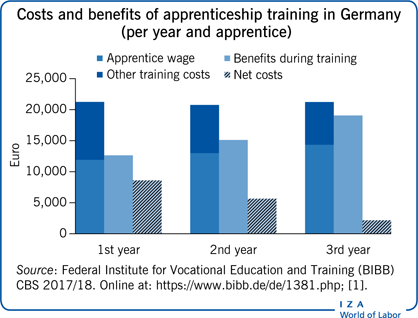Elevator pitch
Apprenticeship training programs typically last several years and require substantial investments by training firms, largely due to the associated labor costs for participants and instructors. Nevertheless, apprentices also add significant value in the workplace. One tool to measure the costs and benefits of training for firms is employer surveys, which were first introduced in the 1970s in Germany. Such cost–benefit surveys (CBS) help to better understand a firm's demand for apprentices and to identify market failures. Therefore, CBS are an important tool for designing effective training policies.
Key findings
Pros
Cost–benefit surveys (CBS) provide detailed knowledge about the structure of training costs and benefits at different stages of an apprenticeship and provide a better understanding of firms’ training behavior.
CBS help measure training benefits without explicitly observing an apprentice’s absolute productivity.
Post-training benefits in the form of saved hiring costs for skilled workers can be revealed using CBS.
Regular use of CBS facilitates the development of evidence-based training policies.
Cons
Measuring all types of training benefits by means of CBS is challenging, particularly with respect to long-term benefits.
Evaluation outcomes depend on the underlying assumptions of cost–benefit models, including a subjective performance assessment of training instructors that always includes some noise.
Evaluating CBS results is time-consuming, requiring both expertise and interest, which may discourage some firms from participating.
